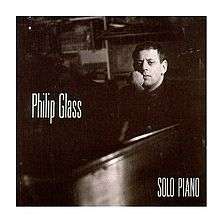Solo Piano (Philip Glass album)
| Solo Piano | |
|---|---|
 | |
| Studio album by Philip Glass | |
| Released | 1989 |
| Genre | Minimalism |
| Professional ratings | |
|---|---|
| Review scores | |
| Source | Rating |
| Allmusic | |
| Pitchfork | 9.2/10[2] |
Solo Piano (1989) is an album of piano music composed and performed by Philip Glass. It was produced by Kurt Munkacsi.
The title of five of the seven tracks, "Metamorphosis", refers to and was inspired by the 1915 short story The Metamorphosis by Franz Kafka. While all pieces were written in 1988, some were written for a staging of Metamorphosis, while others were for a documentary film called The Thin Blue Line directed by Errol Morris. "Mad Rush" was written in 1979 and is based on an earlier organ piece; it was later used by the choreographer Lucinda Childs. The title of the last composition is a reference to Allen Ginsberg's poem Wichita Vortex Sutra, and was composed, in collaboration with Ginsberg, for both a reading and recording of the poem.[3]
"Metamorphosis One" is played in an episode of Battlestar Galactica by Kara "Starbuck" Thrace.[4] Within the narrative, her father composed and performed the piece. It is also played in the series finale of Person of Interest, Return 0. "Metamorphosis Two" formed the basis of one of the main musical themes in the film The Hours. It is also the song that the American rock band Pearl Jam uses as their introduction music to concerts.
Track listing
All tracks composed and arranged by Philip Glass.
- "Metamorphosis One" – 5:41
- "Metamorphosis Two" – 7:22
- "Metamorphosis Three" – 5:33
- "Metamorphosis Four" – 7:01
- "Metamorphosis Five" – 5:10
- "Mad Rush" – 13:48
- "Wichita Sutra Vortex" – 6:53
References
- ↑ http://www.allmusic.com/album/r125709
- ↑ Walls, Seth Colter. "The Complete Sony Recordings - Review". Pitchfork Media. Condé Nast. Retrieved November 22, 2016.
- ↑ Glass, Philip (1991). Solo Piano (Sheet music). London: Chester Music. p. 1. ISBN 0-7119-9557-5.
- ↑ Storm, Jo (2007). Frak you! : the ultimate unauthorized guide to Battlestar Galactica. Toronto: ECW Press. p. 109. ISBN 9781550227895. Retrieved 2 January 2016.